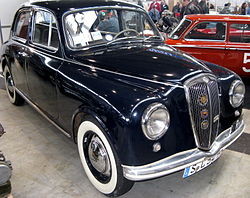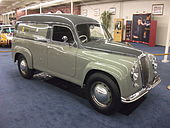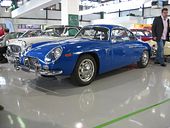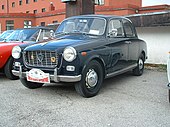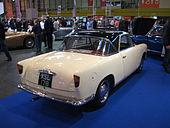Lancia Appia
| Lancia | |
|---|---|
|
Lancia Appia (1953-1956)
|
|
| Appia | |
| Production period: | 1953-1963 |
| Class : | Lower middle class |
| Body versions : | Limousine , station wagon , panel van , coupe , convertible |
| Engines: |
Petrol engines : 1.1 liters (28-44 kW) |
| Length: | 3865 mm |
| Width: | 1420 mm |
| Height: | 1422 mm |
| Wheelbase : | 2350-2510 mm |
| Empty weight : | 820-920 kg |
| Previous model | Lancia Ardea |
| successor | Lancia Fulvia |
The Lancia Appia is a passenger car model from the automobile manufacturer Lancia , which was produced in three different series from spring 1953 to autumn 1963. In the first series (1953–1956) 20,005, in the second (1956–1959) 22,424 and in the third (1959–1963) 55,577 vehicles were built.
Model history
The Appia was more expensive than the Fiat 1100 and not as fast as the Alfa Romeo Giulietta . Like the Fiat 1100 before the war, it does not have a B-pillar, so that a large space opens up with the opposing doors. The four-cylinder V-engine with closely spaced cylinders (bank angle 10.14 °) has two camshafts below , hemispherical combustion chambers and a crankshaft with two bearings. The front wheels are individually suspended from a straight line with sliding sleeves; At the rear, the Appia has a rigid axle on leaf springs with telescopic shock absorbers . It has a simple worm steering system and hydraulically operated drum brakes on all wheels. Unlike the larger Aurelia , the Appia does not have the transmission on the rear axle ( transaxle ). Thanks to the lighter 4-cylinder 4-cylinder installed in the engine compartment, an aluminum bonnet and the placement of the heavy battery under the trunk floor, the Appia sedan also achieves an almost ideal weight distribution between the front and rear axles. In the first series of the Appia sedan, large parts of the body and add-on parts were made of aluminum, which on the one hand was expensive to produce and on the other hand was not particularly suitable for everyday use, so that Lancia did not use aluminum on a large scale in the further series.
In addition to the sedan, two coupé versions were produced by Zagato , one by Pininfarina and a convertible by Vignale . There was also a Viotti "Giardinetta" station wagon version based on the third series. Specialists such as Garavini manufactured , among other things, ambulances based on Appia.
Engines
| Model | Year of production | engine | Displacement | power | Fuel system |
|---|---|---|---|---|---|
| Sedan (1st series) | 1953-1956 | V4 | 1089 cc | 38 HP (28 kW) | Carburetor |
| Sedan (2nd series) | 1956-1959 | V4 | 1089 cc | 43 HP (32 kW) | Carburetor |
| Sedan (3rd series) | 1959-1963 | V4 | 1089 cc | 48 hp (35 kW) | Carburetor |
| Coupé, convertible | 1956-1963 | V4 | 1089 cc | 53 hp (39 kW) | Carburetor |
| GTS | 1956-1958 | V4 | 1089 cc | 58 hp (43 kW) | Carburetor |
| Sports | 1960-1963 | V4 | 1089 cc | 60 hp (44 kW) | Carburetor |
gallery
Web links
Individual evidence
- ↑ http://www.zuckerfabrik24.de/fiat/pics/508c_tst23.jpg
- ↑ http://www.sportscarshop.com/lancia-appia-zagato-front-suspension-rebuild
- ↑ Fornai, Alberto; Puttini, Sergio: Media, robusta, di panno vestita . La Manovella, November 1984, pp. 55-61 .
